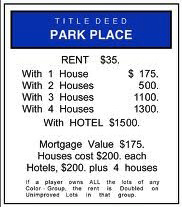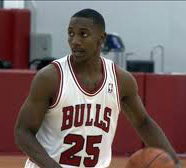Fantasy Basketball Primer Part 1: Introduction
Have you ever played a game largely determined by luck — like Monopoly — against someone who just kept beating you? He wouldn’t win every time, just often enough that you wondered how could he be so damned lucky. Well, I am one of those guys, and while it may seem that I’m “so damned lucky,” you know that I am not. I simply play the game with a well-thought-out strategy that takes advantage of the rules to maximize my luck.
 Fantasy basketball, like Monopoly, is a game heavily influenced by luck. There are several rules that you can take advantage of to maximize your odds for winning. Over the next five weeks, I will present this primer for winning your fantasy hoops league. We’ll examine some of the most common rule variations and explain how you can benefit from them, plus some tips on how to apply those advantages in your draft and throughout your season.
Fantasy basketball, like Monopoly, is a game heavily influenced by luck. There are several rules that you can take advantage of to maximize your odds for winning. Over the next five weeks, I will present this primer for winning your fantasy hoops league. We’ll examine some of the most common rule variations and explain how you can benefit from them, plus some tips on how to apply those advantages in your draft and throughout your season.
Note that I have never played or coached a minute of competitive basketball. I refuse to watch college basketball games before the tournament (one year I watched a lot of college ball hoping to gain an edge and had the worst bracket of my life; no pre-tournament college ball for me since = much better brackets) so I claim no particular insight into the incoming rookie crop.
I am not a mathematical genius with some mythical proprietary logarithm that spits out cutting edge NBA player forecasts. I don’t have a keen appreciation of NBA talent that allows me to identify the breakthrough talents that everyone else misses. Yet, I have had a surprising amount of success playing fantasy hoops by following the simple lessons in this primer and they can help you win your league, too.
How did I come up with these lessons? By analyzing the rules of the game and strategizing how to take advantage of them (Parts 2 and 3). You’ll learn how to identify sleepers, i.e. players who are likely to outperform their average draft position (Part 4), how to build a draft plan (Part 5) and some in-season tactics (Part 6).
Does following this primer guarantee your success? No, it maximizes your odds for success. Does it work for every league, every year? Absolutely not; you will have to make adjustments depending on the context. Does a good strategy trump poor player selection? Sometimes. If you pick bad players, no strategy is going to save you. In a competitive league though, where everyone has the same approximate player valuations, the difference between first and last becomes about picking the right players and this primer will definitely help you to separate the right players from the wrong ones.
 So, what is my strategy at Monopoly? In a sentence, fortune favors the bold. Buy every property and build every house you can, including fully mortgaging any undeveloped properties. Accept any fair trade of properties that completes a set after Free Parking. Develop the most trafficked properties first (from Free Parking to Straight to Go).
So, what is my strategy at Monopoly? In a sentence, fortune favors the bold. Buy every property and build every house you can, including fully mortgaging any undeveloped properties. Accept any fair trade of properties that completes a set after Free Parking. Develop the most trafficked properties first (from Free Parking to Straight to Go).
Finally, follow the three-house rule. Rent rates are not linear. There is a significant spike in rent for all properties with three houses — just look at the Park Place Title Deed. The value of the third house is $600 of increased rent, whereas the second is only $325 and the fourth is a measly $200. So, always try to have three houses on as many properties as possible and never buy a fourth house on any property until all developable properties have three houses.
Now that I have teased you, please come back next week for a look at some detailed strategies for Rotisserie, Head-to-Head and Keeper leagues. In the meantime, I suggest you catch-up on the off-season player movement by reading Chris Sheridan’s Report Cards, Chris Bernucca’s team-by-team analysis and Fantasy Spin’s Depth Chart.
Also, check in daily to Sheridan Hoops for specific player advice and analysis like the NBA Zero’s, Rookies and an injury update. Follow us on Twitter @SheridanFantasy all season long.
Now since this is about fantasy basketball and not a board game column, let’s tip-off with a discussion about the 301st player on our Depth Chart, Marquis Teague. Yesterday, Kent Williams posted his Point Guard tiers and called Teague “arguably the best player left off our Depth Chart.” Now, I agree with where Teague is ranked — alongside Austin Rivers, Kendall Marshall and Kemba Walker seems right to me — but I do want to highlight his case as the best fantasy player not on our Depth Chart.
Chicago Point Guard Dilemma
Teague’s case rests not on his particular skills or chances to grow into an NBA point guard but in the simple fact that Chicago has no one else on their roster who can dribble penetrate and create shots. Last year, the Bulls were relatively unique in their reliance on a single player to fill that role. This should not surprise anyone. When you have Derrick Rose, why would want to put the ball in anyone else’s hands? The problem is that the Bulls won’t have Rose to start the season and at this point in his recovery can only guess when he will return — current indication is after the all-star break.
 Even if the Bulls don’t want to play Teague, they may have to if they wish to score. The nominal starter, Kirk Hinrich, is at this stage of his career a back-up whose greatest skill is his defense. He can carry the ball up the court, set the offense and hit open looks but he doesn’t have that quick step to push off the defender and create passing lanes. Unfortunately, his skill set is very similar to the Bulls’ other perimeter options in Richard Hamilton and Luol Deng. And, none of the leading front court options have the skills to play a point forward role. Given the Bulls desperate need for Teague’s skills, I actually expect to see Teague and Hinrich on the floor together.
Even if the Bulls don’t want to play Teague, they may have to if they wish to score. The nominal starter, Kirk Hinrich, is at this stage of his career a back-up whose greatest skill is his defense. He can carry the ball up the court, set the offense and hit open looks but he doesn’t have that quick step to push off the defender and create passing lanes. Unfortunately, his skill set is very similar to the Bulls’ other perimeter options in Richard Hamilton and Luol Deng. And, none of the leading front court options have the skills to play a point forward role. Given the Bulls desperate need for Teague’s skills, I actually expect to see Teague and Hinrich on the floor together.
Why should you like Marquis Teague for your team? First, as Kentucky’s point guard, he has succeeded at the highest level of college basketball. Second, he played for an excellent coach with not only NBA experience but a track record of developing NBA Players in John Calipari. That should ease his transition. Lastly, his major weakness is his decision making, but that can be overcome playing for one of the league’s best coaches, with Rose and Hinrich as mentors and supported by a team of proven veterans.
Bringing this back to fantasy, in keeper leagues Teague’s upside warrants his selection ahead of Hinrich. In re-draft leagues, especially in head-to-head where early season results matter more, Teague warrants drafting ahead of Derrick Rose. He is not on our Depth Chart, but that doesn’t mean he shouldn’t be on your draft cheat sheet.
It’s algorithm, not logarithm.
Jeff, it’s great to have you on the team this year, even if we can’t agree on Teague. As always, you make a strong, logical case. It’s just one of my hunches — which are often wrong — that coach Thibodeau prefers veterans and will let Hinrich shoulder a big load. Somebody had to be #301 on our depth chart; one way to solve that issue would have been to include all 15 players on each team, with Teague listed right below the injured Rose. However, the vast majority of fantasy owners don’t need to prepare 450 players deep and 30 more rows would have been a LOT of extra work for yours truly.